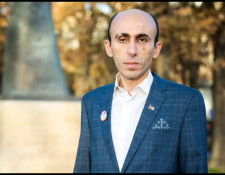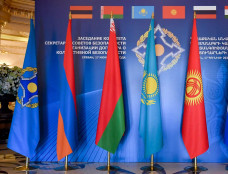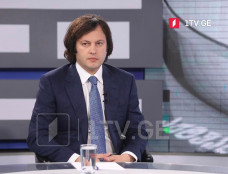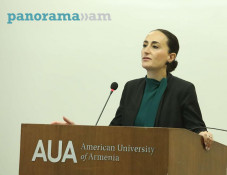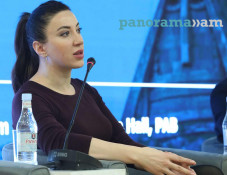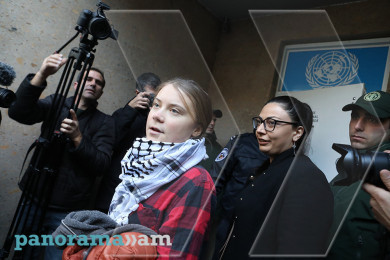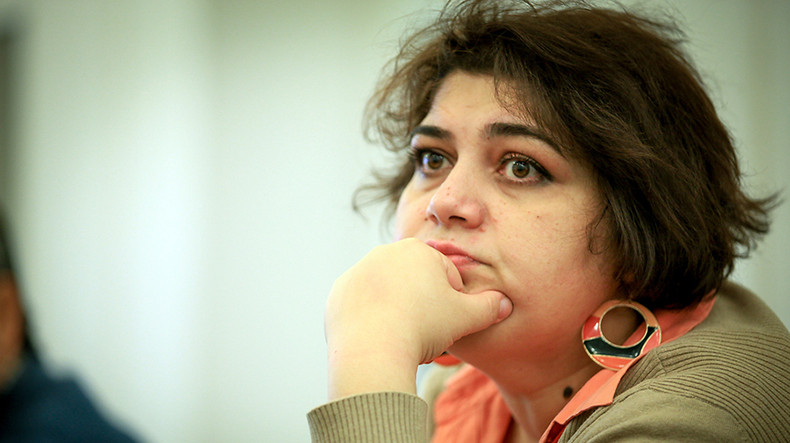
“Unsent letter” or Khadija Ismayilova’s discretional courage
Note: Panorama.am publishes the article by deputy Editor-in-Chief of “Golos Armenii” newspaper Marina Grigoryan, originally appeared in print on August 5, 2016.
On July 14, Index on Censorship published Azerbaijani journalist, Khadija Ismayilova’s “Unsent letter from prison”, taken from her Facebook page. As the author states, the letter was written “in the middle of the Ukrainian crisis and the so-called “trial” of Dilgam Askerov and Shahbaz Guliyev”. Since it’s quite difficult to determine “the middle of the Ukrainian crisis”, we’ll focus on Stepanakert trial, held on October 27 – December 29, 2014. Ismayilova was arrested on December 5 of the same year, therefore, the letter in English was written in the middle of December, according to the author.
The curious thing is that in the original letter, Ismayilova calls it a “mock” trial, yet Index on Censorship replaced it with “so-called”. However, this is the only difference from the original text, full of not only hatred and mud concerning Nagorno Karabakh, but also outright lies regarding the case of Karvachar saboteurs. Such falsifications and distortion of the facts are twice as dangerous coming from the well-known journalist, recognized by the international community for her investigative articles on corruption in the higher echelons of leadership, including the financial fraud of Ilham Aliyev and his family. “The prison management had learned that I was writing something and sent officers in search of it. All my writings were taken including this letter. It was returned to me two months later when it was outdated no longer made sense to send,” Ismayilova writes in the introduction to the “unsent letter”. One can’t help but ask, if the letter had lost its relevance in the beginning of 2015, why does she publish it now after a whole year and a half?
As far as we know, during her journalistic career, Ismayilova had never touched upon the Karabakh issue (which also gives rise to doubt for determining the date the letter was written, but more on that below). In this case she addresses the issue in the context of her thoughts of whether Aliyev’s regime should cover up and justify their own violations of human rights by “criminal actions of Armenia and a separatist regime in occupied Karabakh”. According to her, what’s the reason to cover up those violations by bringing up “patriotic-sensitive” topics, putting them on par with the expectations of the international community from “the criminal regime of separatists and sovereign state, a member of the Council of Europe, OSCE, UN etc”.
As it turns out, when saying “patriotic-sensitive” topics Ismayilova means the trial of saboteurs and murderers, Dilgam Askerov and Shahbaz Guliyev in NKR. It also appears that the independent investigative journalist and a brave defender of human rights, is in wild delight of her compatriots, who had committed several crimes in the territory of Artsakh and got an adequate punishment. “I do admire the courage of Askerov and Guliyev, who ignored the “de-facto” results of the occupation and paid continuous visits to the graves of their siblings and their homes under occupation. They have been doing it for the past ten years, using mountain paths, bypassing Azerbaijani troops and occupants, right up until they were captured,” Ismayilova writes tenderly.
The letter of the laureate of several journalist awards, including the “Courage of Journalism Award” is in fact no different from the articles of Azerbaijani propaganda, published on pages of various websites and newspapers on daily basis distorting the essence and content of the Karabakh issue. It is filled with hatred towards Artsakh and its people. You’d really expect a bit more balanced and civilized approach from a person positioning herself as an independent journalist and a human rights activist. However, not only Ismayilova doesn’t consider it necessary to hide her own fierce hatred towards Artsakh and its people, by calling Armenian and NKR authorities “criminals” etc, but also deliberately distorts the facts concerning those convicted saboteurs.
The “patriotic-sensitive topic” presented by the “courageous journalist” eventually turns into a cover-up and justification of crimes committed by Askerov and Guliyev, something in which Ismayilova accuses the Aliyev regime, but in relation to what is happening inside the country. Let’s leave aside the evidence of crossing NKR border, their espionage activities within the territory of the republic and connections with Azerbaijani intelligence agencies. Yet Ismayilova says no word that those saboteurs, who she so admires killed two people, including the kidnapped 17-year-old boy and seriously wounded a woman. Apparently, the brave journalist and human rights activist is guided by a well-known principle that “killing an Armenian isn’t considered a crime in Azerbaijan”, which was proclaimed by the lawyers of the night killer Ramil Safarov during his trial in Budapest. In this case, what’s the difference between the journalist, kindly treated by the West, and Azerbaijani Ombudsman, Suleymanova, who proclaimed the bastard Safarov an example for the Azerbaijani youth? What’s the difference between the hero of modern journalism, Ismayilova and Soviet era singer, Khanlarova, who declared Safarov a hero, deserving a monument and claimed she would do the same?
They say like country, like heroes. So, the heroes of Azerbaijani domestic consumption are murderers like Safarov and Askerov and outside its borders, Khadija Ismayilova justifying their crimes and showing maximum solidarity in this matter with the regime she had denounced so violently. She didn’t raise her voice after the glorification of Safarov, which by the way, her less famous compatriots did. But today she distorts and conceals the facts, seeking to protect the murderers and put them in the position of victims “of the criminal separatist regime”. If Ismayilova is such a bold and independent truth-seeker, what prevented her from arriving in Stepanakert as a journalist on trial and form her own opinion on the process, free from lies and propaganda of the authorities?
Ismayilova’s discretional “courage” and integrity is her own business, especially when it concerns the Karabakh issue we can’t expect a more or less objective approach even from Azerbaijani human rights defenders. We wouldn’t even have touched upon this topic, if not the publication of the letter, which she considered irrelevant a year and a half ago, after a little over two months since her release from the prison. It is no secret that Azerbaijani authorities didn’t manage to achieve the involvement of international structures in the case of the spies, despite all attempts of presenting them as innocent “hostages”. No self-respecting organization or stat wanted to take on this stinking case, and the European Court of Human Rights refused to consider the lawsuit filed by relatives. Apparently, Baku leadership decided to use Ismayilova’s authority to draw attention to the saboteurs, in the meantime, throwing mud at the Republic of Artsakh with the help of the famous journalist.
Everybody knows how they break even the most resistant people in Azerbaijani prisons. Therefore, questions like when exactly the letter was written and why the “outdated” topic suddenly became relevant to Khadija, doesn’t seem rhetorical at all. Just like the question of whether it was worth for the well-known journalist to soil herself with this criminal case, which all human rights organizations without exception disdained to take on. If it comes to that, you can admire criminals silently, without damaging your own professional reputation, which in this case is called into doubt.
Newsfeed
Videos






